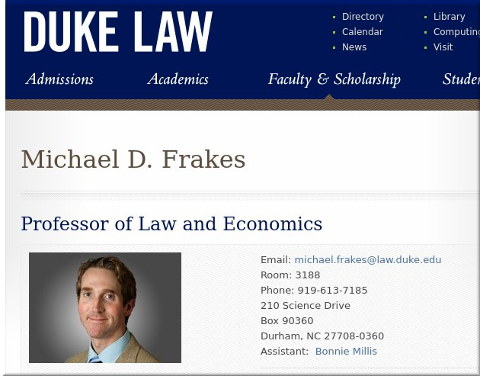

THE year is ending today and we have broadened our scope for observing news about software patents. Expect more next year than in the past year.
Problem
There is general agreement that the U.S. Patent and Trademark Office issues too many invalid patents—those patents issued on an existing technology or on an obvious technological advancement—that are unnecessarily reducing consumer welfare, stunting productive research, and discouraging innovation. However, there has until recently been little to no compelling empirical evidence that any particular feature of the patent application system causes the Patent Office to allow the granting of invalid patents, making it difficult to fully reform the patent system.
Proposal
Frakes and Wasserman build upon new empirical evidence to propose three changes to the patent system that would reduce the issuance of invalid patents: (1) restructuring the Patent Office’s fee schedule to minimize the risk that fee collections will be insufficient to cover its operational costs, while also diminishing its financial incentive to grant patents when collections are insufficient; (2) limiting the number of repeat applications that applicants can file for the same invention; and (3) increasing the time examiners spend reviewing patent applications.
Abstract
There is general agreement that the U.S. Patent and Trademark Office is issuing too many invalid patents that are unnecessarily reducing consumer welfare, stunting productive research, and discouraging innovation. In this paper, Frakes and Wasserman build upon new empirical evidence to propose three changes to the patent system that would reduce the issuance of invalid patents: (1) restructuring the Patent Office’s fee schedule to minimize the risk that fee collections will be insufficient to cover its operational costs, while also diminishing its financial incentive to grant patents when collections are insufficient; (2) limiting the number of repeat applications that applicants can file for the same invention; and (3) increasing the time examiners spend reviewing patent applications.
"As longtime readers may know (some people have been reading the site for over a decade), we are not against patents. We are against software patents."Always remember that some of the heaviest lobbying for software patents comes from Watchtroll. So we have decided to watch it a little more closely in the coming year. Towards the end of the year this site/front group had mostly summaries/meta (e.g. [1, 2, 3]), but it also said: "In recent years, life as an IP strategist admittedly has been turbulent. Pivotal judicial decisions, the America Invents Act, and their application in the USPTO and the courts have been widely viewed as reducing the value of patents in the United States."
No, the America Invents Act (AIA) brought PTAB, which actually improved patent quality and increased the value of remaining -- not collective -- patents. The more bogus patents get granted, the lower the value of the whole on an individual basis. We explained this repeatedly in the context of European Patents (EPs) and the EPO.
"The more bogus patents get granted, the lower the value of the whole on an individual basis."As we shall show later today, Watchtroll carries on with PTAB bashing, courtesy of the patent microcosm's echo chamber (people who profit from lawsuits). Here is Watchtroll boosting Paul Morinville, one of the most radical among PTAB bashers. Isn't it incredible that some law firms and even IBM are willing to associate with such people?
By contrast, Juristat offered a more objective annual review and Mark Summerfield down under has shared some statistics and thoughts. Here's what he wrote yesterday:
The coming year promises to be another interesting – and potentially turbulent – one for the Australian patent system. Public consultations have already taken place in relation to proposed changes to patent (and other IP) laws in response to the Productivity Commission’s (PC) review of Australia’s IP arrangements. These changes include potential substantive amendments to the law of inventive step, while draft legislation has already been published in relation to other PC recommendations, including abolition of the innovation patent. It is likely that some, if not all, of these legislative changes will be passed during 2018.